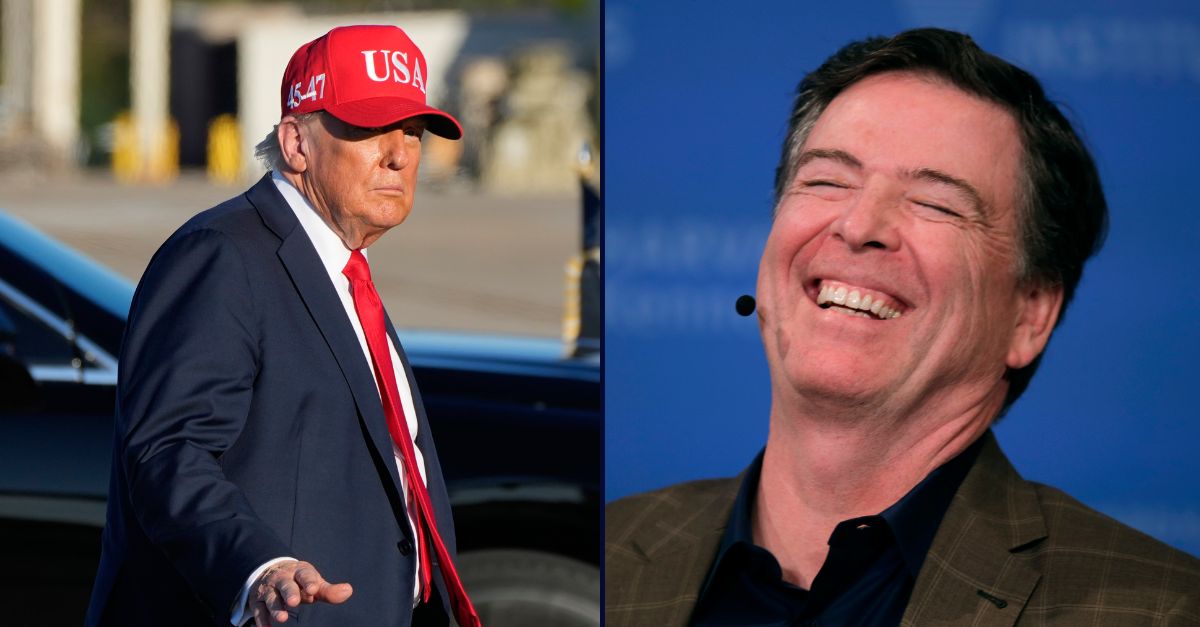
Left: President Donald Trump walks to board Air Force One at Naval Station Norfolk Chambers Field in Norfolk, Va., Sunday, Oct. 5, 2025. (AP Photo/Alex Brandon). Right: Former Director of the Federal Bureau of Investigation James Comey laughs while addressing a gathering at Harvard University's Institute of Politics' JFK Jr. Forum in Cambridge, Mass., Monday, Feb. 24, 2020. (AP Photo/Charles Krupa).
The U.S. magistrate who demanded that the DOJ hand over "all" James Comey grand jury materials for the jurist to review in private has come away from that in-chambers inspection believing that an FBI agent witness and President Donald Trump's former defense attorney turned brand new prosecutor may have compromised the case before the grand jury.
U.S. Magistrate Judge William Fitzpatrick, who had already dinged U.S. Attorney General Pam Bondi's DOJ for an "indict first investigate later" attitude, just one week ago ordered the government to provide grand jury transcripts and audio, plus years-old "Arctic Haze" leak probe evidence, so he could weigh whether there was merit to Comey's arguments in favor of overriding grand jury secrecy.
Comey's defense had claimed that some "misconduct" may have occurred before the grand jury, whether through interim U.S. Attorney for the Eastern District of Virginia Lindsey Halligan's presentation or through a "tainted" FBI agent witness who "may have been exposed" to attorney-client privileged information.
To date, the DOJ has insisted that Comey had fallen well short of showing he had the goods to overcome the "long-established public interest in grand jury secrecy" through "particularized and factually based grounds" in favor of disclosure.
Fitzpatrick's opinion on Monday emphasized, however, that a "disturbing pattern of profound investigative missteps" rendered those contentions unavailing.
"[T]he Court finds that the institutional concerns for grand jury secrecy are greatly outweighed by Mr. Comey's right to Due Process," the magistrate wrote. "The Court recognizes that the relief sought by the defense is rarely granted. However, the record points to a disturbing pattern of profound investigative missteps, missteps that led an FBI agent and a prosecutor to potentially undermine the integrity of the grand jury proceeding."
Noting that ordering the release of the grand jury materials to Comey's defense would not make them public at this time, given the protective order in place, Fitzpatrick said the ex-FBI director deserves to have them because they are "essential" to a fair defense.
"[A]s the Court has found, these materials are essential if Mr. Comey is to fully and fairly defend himself in the face of the irregularities that have characterized this investigation from its inception," the magistrate said.
Love true crime? Sign up for our newsletter, The Law&Crime Docket, to get the latest real-life crime stories delivered right to your inbox
Further down in the opinion, the judge took stock of Halligan's presentation and the testimony of the FBI agent.
Regarding Halligan, the lone signer of the Comey indictment and the only prosecutor in the grand jury room, Fitzpatrick said he "identified two statements" that she made to grand jurors that "on their face appear to be fundamental misstatements of law that could compromise the integrity of the grand jury process."
One of those statements seems to have emphasized that Comey's silence could be used against him.
"Both statements by the prosecutor are in response to questions by grand jurors and are directly related to communications involving Mr. Comey," Fitzpatrick explained, though the exact Halligan statements were redacted.
"The prosecutor's statement that [redacted] is a fundamental and highly prejudicial misstatement of the law that suggests to the grand jury that Mr. Comey does not have a Fifth Amendment right not to testify at trial," the magistrate continued. "The prosecutor's statement ignores the foundational rule of law that if Mr. Comey exercised his right not testify the jury could draw no negative inference from that decision."
The second Halligan statement, Fitzpatrick continued, "clearly suggested to the grand jury that they did not have to rely only on the record before them to determine probable cause but could be assured the government had more evidence–perhaps better evidence–that would be presented at trial."
"[T]he prosecutor made statements to the grand jurors that could reasonably form the basis for the defense to challenge whether the grand jury proceedings were infected with constitutional error," he said.
As for the FBI agent witness? The magistrate found it "troublesome" that the DOJ's "sole witness before the grand jury was exposed to a 'limited overview' of privileged material shortly before he testified."
Comey's defense, therefore, should have the grand jury materials to explore "whether the government's conduct was willful or in reckless disregard of the law," Fitzpatrick said.
"This is particularly significant because Agent-3, after having been exposed to potentially privileged information, chose to testify before the grand jury rather than separate himself from the investigation to contain any further exposure to privileged information and limit any prejudice to Mr. Comey," he added.
Taken together, Halligan and the agent "potentially undermine[d] the integrity of the grand jury proceeding," making this the "rare" time ordering "all grand jury materials" over to the defense was the appropriate decision, Fitzpatrick concluded.
The magistrate ordered those materials to be shared by 3 p.m. and for the government to "no later than" 5 p.m., "produce to the defense the complete audio recording of the grand jury proceedings."
DOJ responded with an emergency motion for a stay, to "allow time for the government to files its objections[.]"
U.S. District Judge Michael Nachmanoff, in turn, stayed the order "pending the resolution of any objections filed by the government," giving the DOJ a deadline of 5 p.m. on Wednesday to submit those objections.
Comey's team was told to file a response by 5 p.m. on Friday.
Days before Halligan's presentation before the grand jury, Trump publicly pleaded with Bondi to install the erstwhile insurance lawyer in place of ousted ex-EDVA interim U.S. Attorney Erik Siebert.
"Lindsey Halligan is a really good lawyer, and likes you, a lot," Trump said.
Read the full opinion here.
Comments